All rights reserved. Published 2009
Infidel poetics : riddles, nightlife, substance / Daniel Tiffany.
p. cm.
Includes bibliographical references and index.
ISBN-13: 978-0-226-80309-8 (cloth : alk. paper)
ISBN-10: 0-226-80309-0 (cloth : alk. paper)
ISBN-13: 978-0-226-80310-4 (pbk. : alk. paper)
ISBN-10: 0-226-80310-4 (pbk. : alk. paper)
1. PoetryHistory and criticism. 2. PoetrySocial aspects. 3. Riddles in literature.4. Nightlife in literature. 5. Cant. 6. Slang. I. Title.
Introduction: Lyric Substance and Social Being
In popular music today, there is a flourishing market in poetic obscurityin lyrics composed in various kinds of slang, jargon, or patois, which make little or no sense to most listeners. Animated by the inscrutable or garbled refrain, eclectic communities take root in the urban chatter of hip-hop, the Haitian creole of Wyclef Jean, the cockney slang of British punk, the Jamaican argot of reggae. No longer does the distribution of music recordingswhether CD or downloadrequire translation of the lyric vernacular. The practice of including song lyrics and occasionally even glossaries in liner notes appears to have fallen from favor, precisely because the task of deciphering lyrics defies the latest poetic and cultural ethos of obscurity. At the same time, lyric obscurity in this context appears to function as a potent ingredient of publicity and celebrity, as the inevitable condition (and the indelible object) of exposure.
This kind of transaction, or seduction, has been going on for a very long time: in 1536, Robert Copland published the first treatise on cant (the jargon of the criminal underworld) in English. Among the canting lyrics he offered to the cultivated reader are the following lines:
Enow, enow. With bousy cove maund nase,
Tour the patrico in the darkman case,
Docked the dell for a copper make:
His watch shall feng a prounces nab-cheat.
Cyarum, by Solomon, thou shalt peck my jere
In thy gan; for my watch it is nace gear;
Or the ben bouse my watch hath a wyn.
Though Coplands reader might have been tantalized by the obscenity and sordid events depicted in this passage, Copland supplied no immediate translation of these lines, thereby leaving in suspense their exact meaning. By not glossing these quire whids (queer words), Copland exposed the tastes of a sentimental reader who, though unfamiliar with the thieves latin in which these lines were composed, nevertheless found pleasure in reading such lyricswithout understanding them. In this respect, the reader of these lines in the twenty-first century, like his sixteenth-century counterpart, finds himself in the darka verbal darknessand indeed is willing to pay for the pleasure of cruising the unknown in a text, to sample the tongue of the cultural infidel (a term first used in this sense in the eighteenth century and referring to a persona shaped at once by the criminal underworld and by political radicalism). Furthermore, the phenomenology of lyric obscurity (and perhaps its political economy as well) remains relatively constant across the conventionally formidable boundaries between literary and vernacular poetrieseven as vernacular obscurity vividly and alluringly marks the horizons of class identity.
Lyric obscuritys possible role in the formation of expressive communities, or subcultures, of identification does not, one must emphasize, depend on the elimination of perplexity or incomprehension in the experience of poetry. On the contrary, if verbal obscurity in general presents an obstacle to communication, and obscurity in literature therefore leads to solipsism and hermeticism, then poetrythe genre of literature most commonly associated with obscurityexercises a mode of linguistic being, so to speak, that involves only the most tenuous sorts of external relations. A poem that defies comprehension is windowless, one might say, at once inviolate and inscrutable. Yet poetry somehow displays the inwardness of language, practicing a kind of naked hermeticism.
I want to emphasize that my analysis of the poetics of obscurity should not be viewed as a defense of obscurantism or an apology for difficult poetry (in contrast to the plain style). Obscurity in poetry is a matter disclosed upon receptionwhat G. W. Leibniz calls perceptionnot something intrinsic to particular properties of the verbal artifact. All verbal phenomena are simultaneously obscure and transparent, taking into account the range of possible responsesor the variability within a single response. Obscurity, from this perspective, is native to the ontology of poetry. More specifically, despite a recent bubble in the accreditation of poetry, the art of poetry persists todayas perhaps it always hasin cultural obscurity. Poetry, its true, sustains a visible subculture, yet common resistance to poetry cannot be isolated from poetrys perceived resistance to communication. Most readers, including many literate and scholarly readers, find poetry to be perplexing or annoying. Indeed, even ordinary language in a poem strikes many readers as confusing, at once alienated and alienating. By contrast, a small coterie of readers (mostly poets and students of poetry) is so thoroughly habituated to lyric obscurity that all poetryfrom this perspectiveappears to be immune to the conditions of obscurity. Another segment of readers (and poets) advances a poetics of transparency, forgetting that even the most accessible poetry will be considered obscure by many readers.
Given the fact of lyric obscurityperhaps the only fact a poem yields to its readersone wonders what sort of bond, if any, a poem establishes with its readers, with the sensory realm evoked by its words, or with the society in which it appears (if indeed it makes an appearance). More to the point, after a century of programmatic obscurity, a great deal of serious poetry appears to have abandoned the task of communication, the will to directly influence common, public discourse and evolving conceptions of community. Must we therefore presume that the obscurity of poetry, in comparison with other genres and media, bars it from overt social engagement and, even more radically, that no viable model of relational being can be deduced from the conditions of lyric obscurity?
Historical attempts to make poetry more directly meaningful to social and political realitiesthat is, to resolve the tension between obscurity and social relevancehave generally called, at least implicitly, for poetry to become more transparent and accessible. To insist periodically that poetry become more prosaic or more theatrical to expand its social horizons, its relational aptitude, seems therefore not only dubious as a political strategy but unsatisfactory as an aestheticand philosophicalprogram. Yet to admit defeat on these terms, to view poetrys relational character as inherently limited in scope, ignores the possibility that the solution to the problem of lyric sociability may lie in the principle of obscurity itself. From this perspective, obscurity, rather than being the principal impediment to poetrys social relevance, would provide the key to models of community derived specifically from the nature of lyric expression.

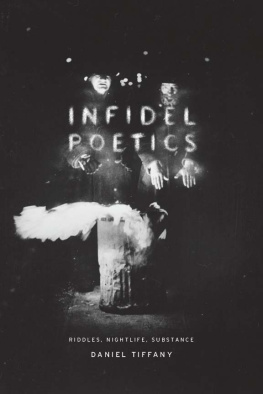

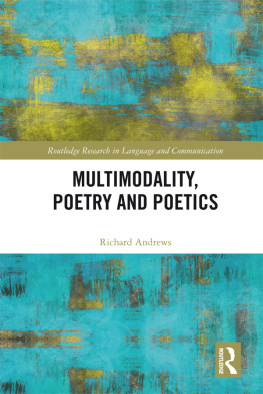
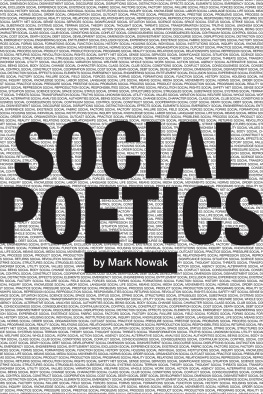
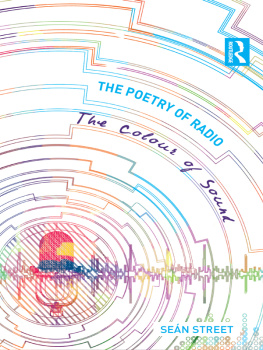
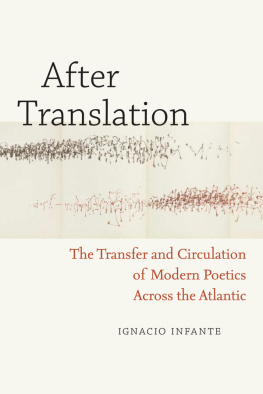
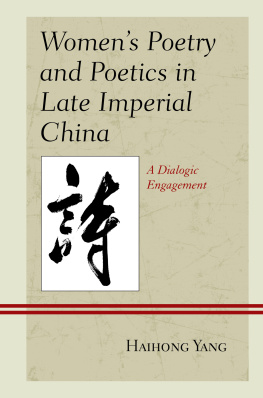

 The paper used in this publication meets the minimum requirements of the American National Standard for Information SciencesPermanence of Paper for Printed Library Materials, ANSI Z39.48-1992.
The paper used in this publication meets the minimum requirements of the American National Standard for Information SciencesPermanence of Paper for Printed Library Materials, ANSI Z39.48-1992.